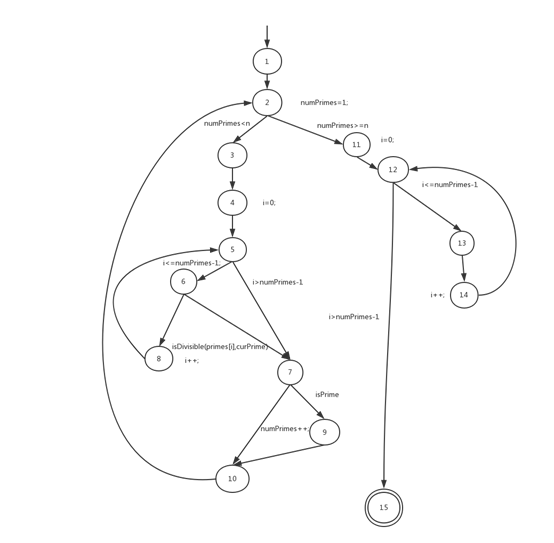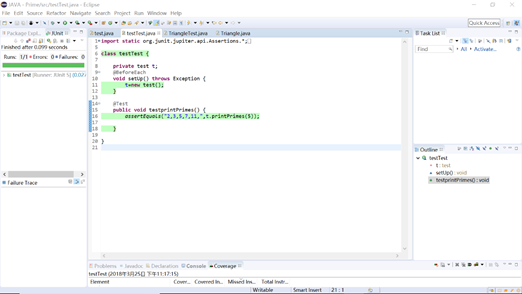Homework3
Use the following method printPrimes() for questions a-d
/**
* Finds and prints n prime integers
* Jeff Offutt, Spring 2003
*/
private static void printPrimes(int n) {
int curPrime; //Value currently considered for primeness
int numPrimes; // Number of primes found so far;
boolean isPrime; //Is curPrime prime?
int[] primes = new int[MAXPRIMES];// The list of prime numbers
// Initialize 2 into the list of primes.
primes[0] = 2;
numPrimes = 1;
curPrime = 2;
while(numPrimes < n) {
curPrime++; // next number to consider...
isPrime = true;
for(int i = 0; i <= numPrimes; i++ ) {
//for each previous prime.
if(isDvisible(primes[i],curPrime)) {
//Found a divisor, curPrime is not prime.
isPrime = false;
break;
}
}
if(isPrime) {
// save it!
primes[numPrimes] = curPrime;
numPrimes++;
}
}// End while
// print all the primes out
for(int i = 0; i < numPrimes; i++) {
System.out.println("Prime: " + primes[i] );
}
}// End printPrimes.
(a) Draw the control flow graph for the printPrimes() method.
(b) Consider test cases t1= (n = 3) and t2 = ( n = 5). Although these tour the same prime paths in printPrime(), they don't necessarily find the same faults. Design a simple fault that t2 would be more likely to discover than t1 would.
(c) For printPrime(), find a test case such that the corresponding test path visits the edge that connects the beginning of the while statement to the for statement without going through the body of the while loop.
(d) Enumerate the test requirements for node coverage, edge coverage,and prime path coverage for the path for printPrimes().
a)

b)将numPrimes<n改为numPrimes<3;
c)test case:[1,2,11,12,13,14,12,15]
printPrimes(1);
d)node coverage:
TR=[1,2,3,4,5,6,7,8,9,10,11,12,13,14,15]
Edge coverage:
TR=[(1,2),(2,3),(2,11),(3,4),(4,5),(5,6),(5,7),(6,7),(6,8),(7,9),(7,10),(8,5),(9,10),(10,2),(11,12),(12,13),
(12,15),(13,14),(14,12)]
Prime path coverage:
TR:
(1,2,3,4,5,6,7,9,10)
(1,2,3,4,5,6,7,10)
(1,2,3,4,5,7,10)
(1,2,3,4,5,7,9,10)
(1,2,3,4,5,6,8)
(5,6,8,5),
,(6,8,5,7,9,10)
,(6,8,5,7,10)
(6,8,5,6)
,(8,5,6,7,9,10)
,(8,5,6,7,10)
(8,5,6,8),
(1,2,11,12,15)
(1,2,11,12,13,14)
(12,13,14,12)
(13,14,12,13)
(13,14,12,15)
(14,12,13,14)
基于Junit和Eclemma实现一个主路径覆盖的测试
public class test{
public String printPrimes (int n)
{
int curPrime; // Value currently considered for primeness
int numPrimes; // Number of primes found so far.
boolean isPrime; // Is curPrime prime?
int MAXPRIMES=20;
int [] primes = new int [MAXPRIMES]; // The list of prime numbers.
// Initialize 2 into the list of primes.
primes [0] = 2;
numPrimes = 1;
curPrime = 2;
while (numPrimes < n)
{
curPrime++; // next number to consider ...
isPrime = true;
for (int i = 0; i <= numPrimes-1; i++)
{ // for each previous prime.
if (isDivisible (primes[i], curPrime))
{ // Found a divisor, curPrime is not prime.
isPrime = false;
break; // out of loop through primes.
}
}
if (isPrime)
{ // save it!
primes[numPrimes] = curPrime;
numPrimes++;
}
} // End while
// Print all the primes out.
String re="";
for (int i = 0; i <= numPrimes-1; i++)
{
//System.out.println ("Prime: " + primes[i]);
re+=primes[i]+",";
}
return re;
} // end printPrimes
public boolean isDivisible(int n,int m)
{
if(m%n==0)
return true;
else return false;
}
}
import static org.junit.jupiter.api.Assertions.*;
import org.junit.jupiter.api.BeforeEach;
import org.junit.jupiter.api.Test;
class testTest {
private test t;
@BeforeEach
void setUp() throws Exception {
t=new test();
}
@Test
public void testprintPrimes() {
assertEquals("2,3,5,7,11,",t.printPrimes(5));
}
}



